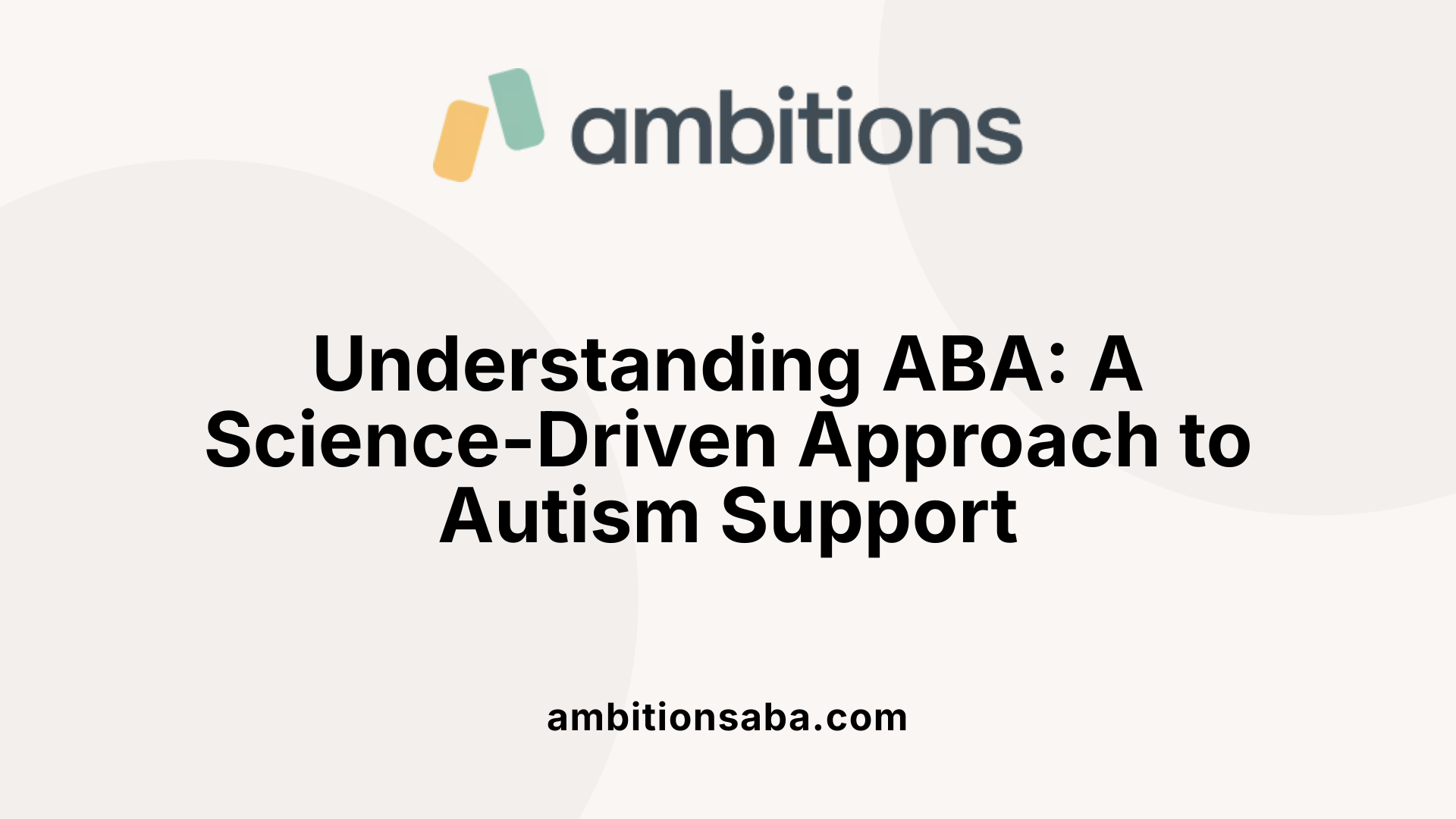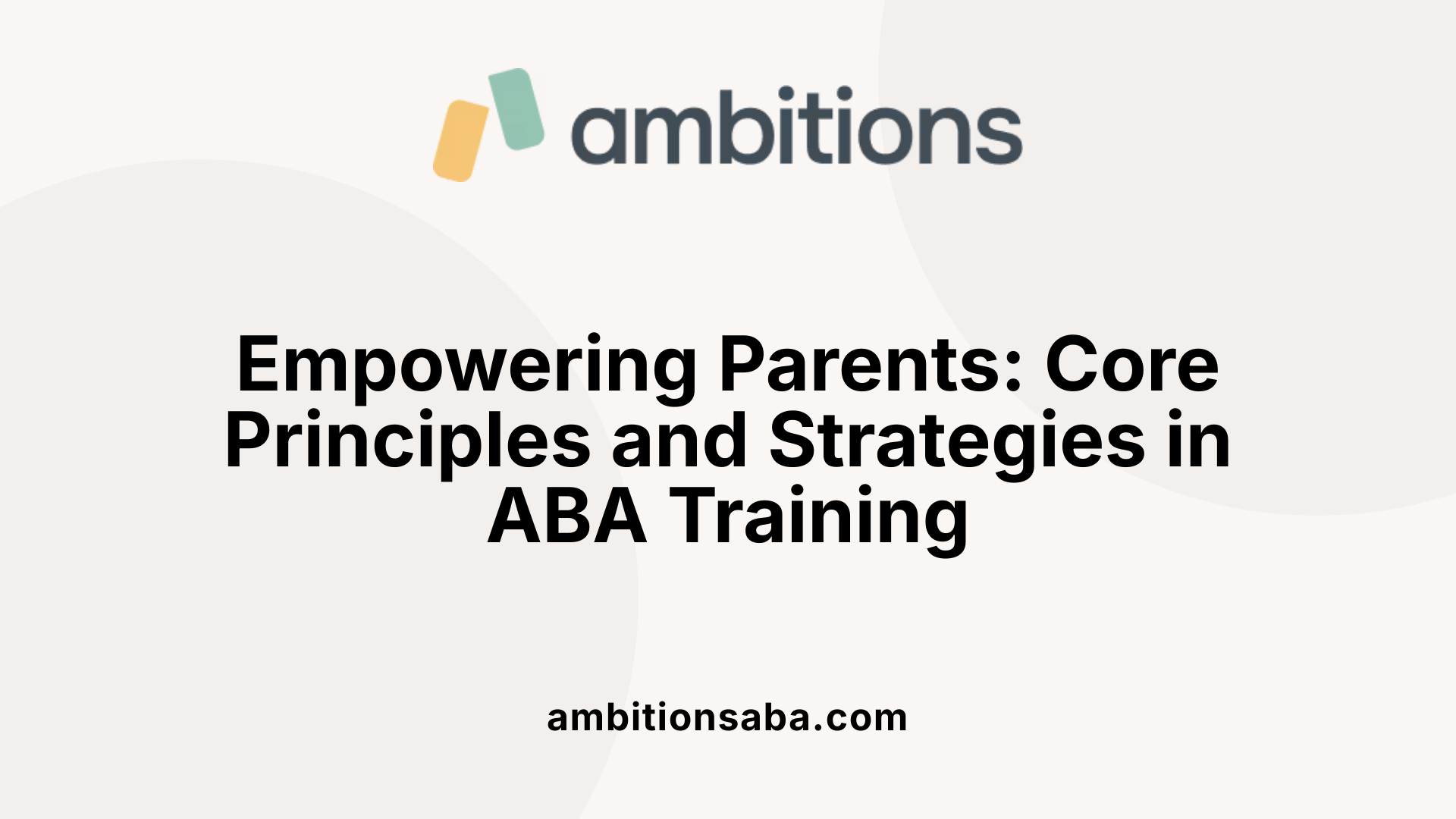Fostering Integrity: Using ABA to Promote Honesty in Children
Understanding the Role of Parent Training in ABA Therapy
Parent training is a crucial component of Applied Behavior Analysis (ABA) therapy for children with autism spectrum disorder (ASD). This training equips caregivers with essential skills and knowledge to effectively support their child's development both during therapy sessions and in everyday life. By collaborating closely with ABA professionals, parents learn how to implement behavior strategies that promote positive changes, foster independence, and strengthen family dynamics.
Overview of ABA Therapy and Its Role in Autism Treatment

What is Applied Behavior Analysis (ABA) therapy, and how is it used to treat autism?
Applied Behavior Analysis (ABA) therapy is a science-driven method focused on understanding and improving behaviors in individuals with autism spectrum disorder (ASD). It employs behavior principles such as positive reinforcement to teach socially important skills and reduce challenging behaviors.
ABA is individualized to each child’s needs. Licensed professionals, such as Board-Certified Behavior Analysts (BCBAs), assess the child's strengths and areas needing support, then develop treatment plans with specific goals. These goals are measurable and track progress over time, ensuring therapy adapts to the child’s changing needs.
Therapy sessions occur in various settings—homes, clinics, schools, and community environments—to help children generalize skills across everyday life. Family involvement is essential; parents receive training to apply ABA techniques consistently at home, enhancing learning and behavior change.
The collaborative approach combines structured teaching methods, such as Discrete Trial Training and naturalistic interventions, with data-driven adjustments. This leads to improvements in communication, social interaction, independence, and adaptive behaviors.
Research supports ABA’s effectiveness in enabling children with ASD to reach their potential and improving family dynamics by empowering caregivers with practical strategies.
Professionals Leading ABA Therapy and Parent Training

Who typically provides ABA therapy, and what qualifications do these professionals have?
ABA therapy is delivered by a team of trained professionals, primarily including Board Certified Behavior Analysts (BCBAs), Board Certified Assistant Behavior Analysts (BCaBAs), and Registered Behavior Technicians (RBTs). BCBAs are the lead experts who hold graduate or doctoral degrees in behavior analysis or related disciplines, coupled with certification from the Behavior Analyst Certification Board (BACB). They conduct comprehensive assessments, design individualized treatment plans, and oversee therapy progress.
BCaBAs assist BCBAs by supporting treatment implementation and data analysis, operating under BCBA supervision. Registered Behavior Technicians, with specialized training and certification, provide direct daily intervention, working closely with clients to implement planned strategies and collect behavioral data.
What are the responsibilities of ABA professionals?
- BCBAs: Lead assessment and treatment plan creation, supervise all therapy activities, guide parent training, and ensure ethical standards.
- BCaBAs: Support therapy delivery, assist in data collection and progress monitoring, under BCBA supervision.
- RBTs: Implement therapy sessions, follow behavior intervention plans, gather data, and report observations.
How is parent training delivered by BCBAs and RBTs?
Parent training is primarily led by BCBAs, leveraging their expertise to teach families ABA principles like reinforcement, prompting, and behavior management strategies. BCBAs use structured curricula and Behavior Skills Training (BST) methods, including instructions, modeling, and feedback, customizing the approach to the child’s and family’s needs.
RBTs may support parent training by modeling techniques during therapy and reinforcing parents’ skill use, always under BCBA guidance.
What supervision and ethical standards apply to these professionals?
All ABA professionals adhere to rigorous training and certification standards, as well as ethical guidelines established by the BACB. BCBAs must provide consistent supervision to BCaBAs and RBTs, ensuring treatment fidelity and safeguarding client welfare. This team approach promotes quality, accountability, and effectiveness throughout therapy and parent training.
Core Components of ABA Parent Training

Teaching ABA principles to parents
Parent training in ABA (Applied Behavior Analysis) centers on imparting fundamental ABA principles to caregivers. This includes reinforcement techniques, prompting methods, shaping behaviors, and managing challenging behaviors effectively. By understanding these concepts, parents can consistently support positive behavior changes in daily routines.
Behavior Skills Training (BST) method
A common approach within parent training is Behavior Skills Training (BST). BST incorporates instructions, modeling, rehearsal, and feedback to teach parents new skills efficiently. This hands-on method allows parents to learn and practice behavior management strategies under professional guidance, enhancing confidence and competence.
Setting individualized, measurable goals
ABA parent training focuses on goals tailored to the child's specific strengths and challenges. These objectives are clearly measurable, allowing progress to be tracked systematically over time. Measurable goals often relate to skill acquisition, reduction of challenging behaviors, increased independence, and overall developmental gains.
Behavior Intervention Plans (BIPs)
Parents are also trained to implement Behavior Intervention Plans, which include detailed reinforcement schedules and teaching strategies aimed at shaping desired behaviors. Understanding how to follow and adapt BIPs helps caregivers maintain consistency between therapy and home environments, which is crucial for behavior generalization.
Strategies for behavior management and skill acquisition
Effective parent training emphasizes creating supportive home settings that utilize consistent reinforcement and visual aids. Parents learn to manage behaviors calmly, encourage communication and independence, and embed ABA strategies naturally into daily activities. Consistency across the child's environments promotes faster and longer-lasting improvements.
These components collectively empower parents to actively participate in their child's ABA therapy, fostering skill generalization while strengthening family dynamics.
Overcoming Challenges and Enhancing Effectiveness Through Parent Training

What are common barriers to parent training participation?
Many parents face challenges such as time constraints and emotional stress when participating in ABA parent training. These barriers can limit their ability to consistently apply behavior strategies at home.
How can scheduling and support help parents?
Flexible scheduling accommodates busy family routines, making it easier for parents to attend training sessions. Providing emotional support reduces stress and helps parents feel more confident and engaged.
Why is collaboration important between families and therapists?
A strong partnership between ABA professionals and families ensures that training is tailored to the child's unique needs and family's lifestyle. This collaborative approach fosters open communication, making adaptations as needed for better outcomes.
How is progress monitored effectively?
Consistent data collection during therapy and at home tracks the child's progress towards measurable goals. This ongoing monitoring allows for timely adjustments to strategies, ensuring the training remains effective.
What strategies promote consistency and reinforcement at home?
Parents are taught to create supportive home environments that reinforce positive behaviors. Using reinforcement schedules, visual aids, and consistent routines helps maintain progress. Modeling and practice through Behavior Skills Training (BST) equip parents to confidently implement interventions.
Effective parent training addresses challenges through flexibility and support, while fostering teamwork and structured implementation. This enhances both child outcomes and parental confidence, making ABA therapy a collaborative and sustainable journey.
Measuring Success and Long-Term Benefits of Parent Training in ABA
Research Supporting ABA Parent Training Effectiveness
ABA therapy has a strong evidence base as an effective intervention for individuals with autism. Research highlights that parent training in ABA contributes significantly to positive outcomes by enabling caregivers to apply consistent behavior strategies at home and other settings. Studies show that when parents are actively involved and trained, children demonstrate substantial gains in social communication, adaptive skills, and reduced challenging behaviors.
Outcomes Such as Improved Child Behavior and Parental Confidence
Key outcomes from ABA parent training include improved child behaviors, such as increased independence and reduced meltdowns, as well as raised parental confidence in managing daily routines. Training empowers parents with proven ABA techniques, replacing guesswork with structured approaches that promote positive behavior. This enhancement in parental self-efficacy also helps stress reduction within the family.
Skill Generalization Across Settings
A major advantage of parent training is skill generalization. When parents consistently implement ABA strategies across home, community, and school settings, children transfer learned skills more readily. This consistency ensures behaviors are reinforced in varied environments, leading to faster and more durable progress beyond formal therapy sessions.
Impact on Family Stress and Relationships
Understanding the behavioral reasons behind challenges helps families reduce tension and meltdowns, fostering a calmer and happier home atmosphere. Effective parent training improves the parent-child relationship by strengthening communication, trust, and engagement through everyday learning opportunities, ultimately benefiting the entire family dynamic.
Ongoing Parent Involvement After Formal Therapy Ends
Long-term success is supported by continuous parent involvement even after therapy completion. Parents trained in ABA principles continue applying techniques that support ongoing skill-building, helping maintain progress and encouraging independence over time. This sustained collaboration between families and therapists ensures children’s evolving needs are met and positive behaviors persist.
| Aspect | Description | Importance |
|---|---|---|
| Research Backing | Evidence shows parent training improves child and parent outcomes | Validates ABA parent training as an effective method |
| Child Behavior Improvements | Increased adaptive skills, reduced challenging behaviors | Enhances children's quality of life |
| Parental Confidence | Training empowers parents with skills and confidence | Reduces parenting stress, improves family dynamics |
| Skill Generalization | Consistent use across settings promotes broad learning | Ensures long-lasting progress |
| Family Stress Reduction | Understanding behaviors reduces meltdowns and tension | Creates a more supportive home environment |
| Ongoing Parent Involvement | Continued strategy use after therapy supports maintenance | Sustains gains and adapts to new challenges |
The Vital Role of Parent Training in Successful ABA Therapy
Parent training is an indispensable part of ABA therapy that empowers caregivers with practical skills and confidence to support their child's growth. By understanding ABA principles, collaborating closely with therapists, and applying consistent strategies across environments, parents play a key role in maximizing the benefits of therapy. Overcoming challenges through flexible approaches and emotional support further enhances this process. Ultimately, parent training fosters stronger family bonds, improved child outcomes, and lasting progress that extends far beyond the therapy sessions.
References
- Mastering Parent Training in ABA: A Comprehensive Guide
- ABA Parent Training: Tips and Strategies for Parents
- What to expect with ABA Therapy
- Why Parent Training Is Essential in ABA Therapy for Autism
- Parent Involvement in ABA Therapy
- Applied Behavior Analysis (ABA)
- What to Consider When Looking for a Qualified ABA Provider
- IDHS: Behavior Therapist
- Understanding Your Child's ABA Therapy Providers
- The effectiveness of applied behavior analysis program ...

